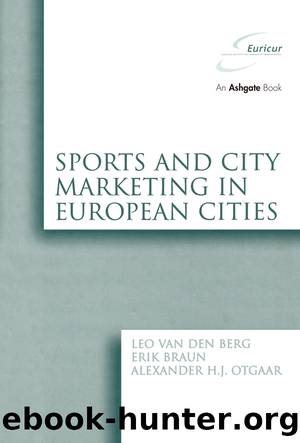Sports and City Marketing in European Cities by Leo van den Berg Erik Braun

Author:Leo van den Berg, Erik Braun [Leo van den Berg, Erik Braun]
Language: eng
Format: epub
ISBN: 9781138254824
Barnesnoble:
Publisher: Taylor & Francis
Published: 2017-02-27T00:00:00+00:00
Source:
The 2002 NW Economic and Social Programme 1999â2004 (The 2002 North West Partnership, 1999).
In 1995, the Manchester City Council developed a sports strategy to maximise the potential of the Commonwealth Games. This strategy has three pillars: facilities, events and participation. The City Council recognised that sports can play a positive role in community well-being and social regeneration. That sports can contribute to the physical (environmental), social and economic regeneration of neighbourhoods is also stressed in a national document on the âvalue of sportâ (Sport England, 1999). This document aims to demonstrate the tangible benefits of sports to individuals and communities, in order to justify its share of the limited public resources. Manchester is one of the frontrunners in translating this document to regional policies, making grateful use of National Lottery resources. Between 1998â2001, the city received £ 130m from these resources, from which £90m have been reserved for the City of Manchester Stadium, £22m for the swimming pool complex and £ 14m for other sports venues (an indoor tennis centre and the National Squash Centre).
For pro-active development, 13 focus sports have been identified. Each sport has its own office. Manchester Leisure aims to improve access to sports opportunities throughout the city by linking schools and clubs, and to raise the image of Manchester as a city of sports on both the domestic and the world stage, helping ongoing and sustainable inward investment and success for its sporting infrastructure. Furthermore, the city wants to ensure that the new facilities for the Games create long-term benefits for the citizens of Manchester. Through Sports Development partnerships these facilities will support the city-wide development plans for each focus sport towards a structured approach to the delivery of coaching programmes, officials and coach education, sports science and international events. Manchester Leisure has created partnerships with national, regional and local sport-related organisations (such as Sport England, Manchester City Football Club, Lawn Tennis Association, etc.). The City has tried to integrate the sports strategy in its revitalisation strategy by linking sports organisations to other organisations such as schools and companies. The revitalisation policies are coordinated by seven area-specific offices in 15 wards. In these offices, civil servants from various departments work together. The area-specific offices cooperate with the sport-specific offices. In that way, links between clubs, schools and companies can be created, possibly making use of national employment programmes (New Deals).
To maximise the regeneration benefits in East Manchester, the MetroLink system will be extended to Sportcity, and the missing link in the ringroad around the city will be realised. Sportcity, which comprises not only sports facilities but also business units and dwellings, can be a catalyst for the development of East Manchester into a new economic growth pole. Its realisation will enhance the quality of the living and location environment and the image of the entire area, especially as the accessibility of the area will be improved as well. This approach fits well into the new policies of the City Council, aimed as they are at stimulating
Download
This site does not store any files on its server. We only index and link to content provided by other sites. Please contact the content providers to delete copyright contents if any and email us, we'll remove relevant links or contents immediately.
Man-made Catastrophes and Risk Information Concealment by Dmitry Chernov & Didier Sornette(6007)
The Revenge of Geography: What the Map Tells Us About Coming Conflicts and the Battle Against Fate by Kaplan Robert D(4067)
Zero Waste Home by Bea Johnson(3833)
COSMOS by Carl Sagan(3618)
Good by S. Walden(3548)
In a Sunburned Country by Bill Bryson(3537)
The Fate of Rome: Climate, Disease, and the End of an Empire (The Princeton History of the Ancient World) by Kyle Harper(3055)
A Wilder Time by William E. Glassley(2858)
Camino Island by John Grisham(2794)
Organic Mushroom Farming and Mycoremediation by Tradd Cotter(2689)
The Ogre by Doug Scott(2679)
Human Dynamics Research in Smart and Connected Communities by Shih-Lung Shaw & Daniel Sui(2500)
Energy Myths and Realities by Vaclav Smil(2487)
The Traveler's Gift by Andy Andrews(2457)
9781803241661-PYTHON FOR ARCGIS PRO by Unknown(2365)
Inside the Middle East by Avi Melamed(2352)
Birds of New Guinea by Pratt Thane K.; Beehler Bruce M.; Anderton John C(2252)
A History of Warfare by John Keegan(2240)
And the Band Played On by Randy Shilts(2198)
